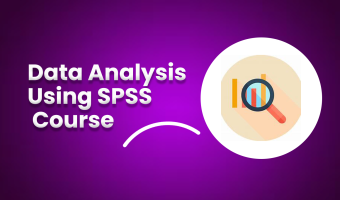Certificate in Data Analysis Using SPSS
About This Course
The Data Analysis Certificate Program with a focus on SPSS provides participants with the skills and knowledge to analyze and interpret data effectively. The program covers key areas such as data management, statistical analysis, hypothesis testing, and reporting, all within the SPSS environment. By the end of the program, participants will be able to apply SPSS for data-driven decision-making in various fields, including research, business, and social sciences.
Learning Objectives
Understand the fundamentals of data analysis and its role in decision-making.
Gain proficiency in using SPSS for data management and statistical analysis.
Apply descriptive and inferential statistics to real-world problems.
Conduct hypothesis testing and interpret statistical results.
Visualize data using SPSS charts and graphs for effective reporting.
Communicate analytical findings through well-structured reports.
Target Audience
- Aspiring Data Analysts: Individuals seeking foundational knowledge and skills to start a career in data analysis.
- Researchers and Academics: Professionals conducting research and requiring advanced data analysis skills.
- Students: Graduate and postgraduate students looking to analyze and interpret data for theses or projects.
- Statisticians: Professionals working with statistical data across industries.
- Government Officials: Employees responsible for analyzing demographic, economic, or other types of data.
- NGO and Nonprofit Managers: Individuals managing program monitoring and evaluation activities requiring data analysis.
- Business Analysts: Professionals using data to drive organizational decision-making.
- Health and Social Scientists: Professionals in public health and social research looking to analyze survey or experimental data.
- Career Changers: Individuals transitioning into roles involving data analysis and statistical reporting.
Curriculum
30h
Module 1: Introduction to Data Analysis and SPSS
This module introduces participants to the fundamentals of data analysis and the SPSS software interface. Students will learn how to navigate SPSS and understand its capabilities for analyzing data. The focus is on building a strong foundation for effective data-driven decision-making.
Module 2: Data Cleaning and Management in SPSS
This module teaches participants how to clean, organize, and manage datasets in SPSS to ensure accuracy and reliability. Participants will explore techniques for handling missing data, removing errors, and preparing data for analysis. The emphasis is on maintaining data integrity for robust analysis.
Module 3: Descriptive Statistics and Data Visualization
This module focuses on descriptive statistical methods and creating visualizations to summarize and explore data trends. Participants will learn to calculate measures such as mean, median, and standard deviation and generate charts and graphs. The goal is to enhance the ability to communicate insights effectively.
Module 4: Inferential Statistics and Hypothesis Testing
Participants will learn to perform inferential statistical analyses in SPSS to test hypotheses and make data-driven conclusions. This module covers concepts like t-tests, ANOVA, and regression analysis. The emphasis is on understanding how to apply these techniques to real-world scenarios.
Module 5: Advanced Statistical Analysis and Reporting
This module explores advanced statistical techniques, such as multivariate analysis and predictive modeling, using SPSS. Participants will also learn how to present their findings through clear and professional reporting. The focus is on developing expertise in analyzing complex datasets and effectively communicating results.





